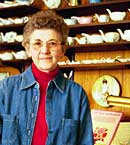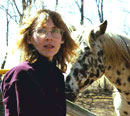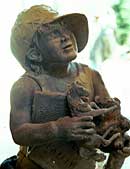
A Town's Outrage
by Art Hughes
April 2000
Many of the violent crimes that captivated Minnesota in the past two years
happened in small towns or rural areas. Moose Lake, Hallock, Waseca and Cannon
Falls now struggle to portray their communities as more than backdrops to
senseless murders. The high-profile crimes served to erase residents'
perceptions that "it doesn't happen here".
At a time when crime rates are down and news headlines across the country tout a
drop in violent urban crime, 44 percent of rural Minnesotans think crime in
their neighborhood is on the rise. An MPR pollshows that crime is the
second-most-serious issue in rural cities and towns. But rural crime is a
quiet violence. It happens in cities and towns where people know each other;
where often, the victim knows the criminal.
THE FOUR-YEAR MYSTERY
of Jessica Swanson's disappearance was solved last summer
when Dale Jenson led authorities to her remains on a remote Goodhue County
hillside. The dramatic developments closed a tragic chapter in Cannon Falls'
history. But for the people who live here, the case also leaves a simmering
bitterness and sense of outrage. People are mad that law enforcement officials
couldn't develop a strong case, that lawyers were successful in defending those
who confessed their guilt, and that a judge could hand down a mere four-year
jail sentence to someone who killed a three-year-old girl.
Longtime Cannon Falls resident Ray Rapp owns an oil-distribution business in
town and was the volunteer fire chief. He responded to the missing child call on
a hot, rainy June morning in 1996.
"You go in the outstate area and people say, 'I know where Cannon Falls
is, that's the one that's been on TV looking for that little girl.' So we were
notorious for not being able to find a little girl that's missing." He says now the town is known as the town that solved a case, but where the killer got off with a fairly-easy sentence.
In addition to his disappointment with the court system and law enforcement,
Rapp blames himself. "I feel bad that we were failures in the fact that we couldn't find the little girl."
Rapp organized the search in those early hours, before the county and the FBI got
involved. He had no way to know Jessica's body was hidden some eight miles south
of town. Rapp, who's responded to numerous emergencies, still wonders wonders
whether he did enough to try to find her.
Many others in Goodhue County with less-tenuous connections to the crime also
have difficulty shaking their sense of outrage. Lorraine Schuchard, a retired
bank teller in Zumbrota still finds it shocking that three suspected
murderers - one in Cannon Falls, one in Moose Lake and one in Brownsville - all
confessed to police, but argued later to retract their confessions.
 |
 |

|
Lorraine Schuchard wonders how Dale Jenson could let his
neighbors continue searching for the girl he knew was dead.
Photo: Art Hughes
|
|
 |
| |
Schuchard also wonders how Dale Jenson, who worked in her town, could let his
neighbors continue searching for the girl he knew was dead.
"I was just so angry with him for not admitting it sooner," she says.
People in town are still angry that the county's only full-time public defender,
Mary Wingfield, did her job so well.
Wingfield says she endured anonymous phone threats while defending Dale Jenson.
She gained considerable legal leverage because an FBI interrogator had illegally
denied Jenson's repeated requests for a lawyer.
Wingfield wonders whether those
so disturbed by Jenson's deception would rather she ignore her client's
constitutional rights.
"It's not a legal issue, it's a community issue," she says. "I'm sure that's
where the long-term frustration comes from in this case. There's a whole lot of
emotional involvement that probably wasn't resolved satisfactorily for them."
There aren't many of Goodhue County's 43,000 residents who don't know the
details of the Jessica Swanson case. Word spreads quickly and Jenson and
Jessica's mother, Michelle Swanson, were under intense scrutiny. The stuff of
small-town gossip later became part of the criminal investigation: The couple
never joined the search themselves and rarely checked with police for updates.
|
"If I live in a small town, part of my identity is connected to the identity of the community. When a really violent crime occurs, it shakes the very foundation of the community in a way that's not true in a larger community."
- Ralph Weisheit
Professor of criminology at Illinois State University
|  |
Ralph Weisheit, a professor of criminology at Illinois State University and an
expert on rural crime, says in places where people still wave to each other
on the road, bad news can strike a heavy blow. "I think it more fundamentally shakes the community, because if I live
in a small town, part of my identity is connected to the identity of the
community," he says. "When a really violent crime occurs it shakes the very foundation of the community in a way that's not true in a larger community."
A few people are compelled to take the discussion past the kitchen table.
David and Lynette Cors of New London returned from a vacation four years ago to
find the inside of their house trashed; an antique china hutch and
irreplaceable wedding gifts were smashed, the contents of their refrigerator and
kitchen cupboards were thrown about.
They started meeting with neighbors and other victims of crimes and discovered
widespread frustration.
"We could sense the anger of the whole
community," David Cors says. "We kept hearing people saying, 'This has got to stop'"
The Cors started reading through police investigations; they write down the
license numbers of suspicious cars, they even follow around people they suspect
of crimes. The Cors' personal attention to local criminal activity seems to
border on vigilantism for some people. But it's mostly welcomed by residents
here who worry crime is gaining momentum.
A 13-year-old boy was convicted of trashing the Cors' home. Two others, who the
Cors suspect were involved, were never charged.
It's common, says criminologist Ralph Weisheit, for residents in rural areas to
impose "informal social control."
"It's
common to find teenagers in a small town who feel suffocated," he says. "As they get
older, they come more and more to appreciate the very thing they found so
annoying when they were young."
 |
 |

|
Leanne Ronning, a sculptor and 30-year resident of Welsh, is working on a memorial to Jessica Swanson.
Photo: Art Hughes
|
|
 |
| |
Weisheit says most of the people who don't embrace those social pressures simply
move away.
That may not apply as much anymore to Cannon Falls, where there are enough new
residents so that not everyone knows everyone else.
To remember Jessica Swanson, people are trying to raise enough money for a bronze
memorial in the town's library.
Leanne Ronning, a sculptor and 30-year resident of Welsh, is working from a familiar picture of Jessica distributed when she first
disappeared.
The money for the sculpture still falls about $500 short.
Ronning, who also works in a Lutheran social-service center, understands that
people here are more likely to be hurt at the hands of someone they know rather
than fall victim to predatory strangers.
Rural crime is most often a quiet violence. The challenge for places like
Cannon Falls and Moose Lake, Waseca and Hallock is to grieve those who are gone,
and work to recognize the potential for harm before it erupts into violence
again.

![]()
![]()
![]()

![]()
![]()
![]()

![]()
![]()
![]()
![]()

![]()
